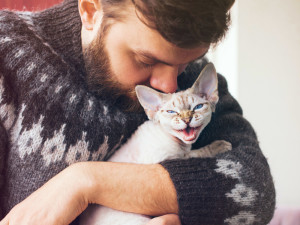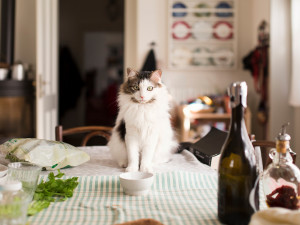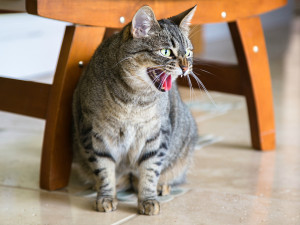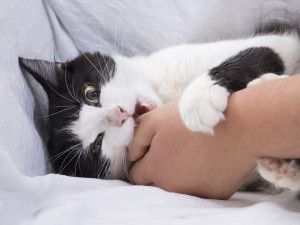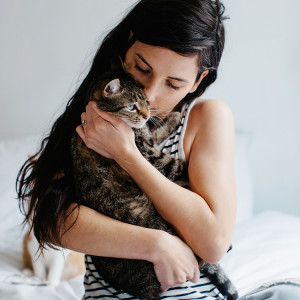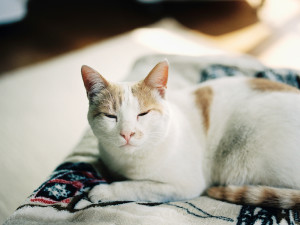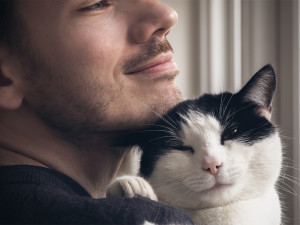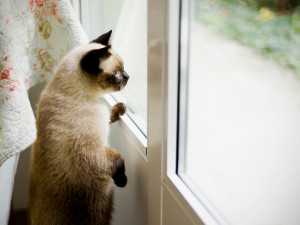Why Does My Cat Lick My Face?
It’s sweet, but a little much.

Share Article
In This Article:
Why Is My Cat Licking My Face? Is It OK If My Cat Licks My Face? How Do I Stop My Cat From Licking My Face?
Sometimes it’s sweet. Sometimes it’s a little annoying. And sometimes, it wakes you up from a dead sleep and makes you want to scream. Why is your cat licking your face? There are many reasons, ranging from personal preference to instinctual behavior and even medical issues. It’s important to understand the cause so you can work on the behavior.
Here are some of the reasons your cat may be licking your face. Keep in mind, they’re all unique little creatures with their own quirks.
Why is my cat licking my face?
Here are some of the reasons your cat may be licking your face. Keep in mind that they’re all unique little creatures with their own quirks.

Displaying affection
Just like being licked by their mother felt comforting and loving when they were kittens, your cat may be licking to show a little love.
Social bonding and scent marking
When cats live in a social group, often, at least one of the cats will groom the others. It’s not necessarily about cleaning them. It’s an instinctual need to build a group scent. This cat, known as the allogroomer, licks each cat in the group, creating a unique scent they all share. This scent is their primary way of identifying each other as “safe” friends. Your cat may be licking you to give you their scent or loop you into the group scent if you have multiple cats.
Grooming instincts
In addition to scent marking, cats groom themselves and each other to clean and move oils through their coat. Your cat could certainly be licking you for the same reason.
Boredom and seeking attention
Cats are smart enough to make connections. For example, if you’re focused on your laptop and your cat is bored or hungry, they lick you. You respond by moving, talking to them, or even getting up and feeding them. They go, “Oh, that’s how I get what I need. Got it!” From that point on, they have a clear reason to lick you. They’re not trying to annoy you. It gets your attention or meets a need. It’s that simple.
This is a common reason cats lick us overnight or very early in the morning. They’re early risers and ready to start the day. We’re fast asleep. A lick makes something happen, even if it’s just you telling them to knock it off!
You may notice other attention-seeking behaviors, like vocalizing, following you around, or getting into things that cause you to react.
You taste good
Your skin may be salty. You may be wearing a lotion or skin product with an appealing taste or scent (though it may not be safe for your cat to ingest). If you taste good, your cat is going to lick you.
Hunger can also cause licking, both as an attempt to nourish themselves and as a way to get your attention. It’s actually quite common for cats to be underfed. They need access to food about every eight hours or they will get hungry, leading to stress, tension between cats, and attention-seeking behavior.
Stress or anxiety relief
Cats are prone to stress. It can be chronic or due to a special circumstance, like construction outside, a new pet or baby in the home, or even a party that afternoon that created a lot of noise. Like people, cats often turn to soothing or compulsive behaviors to calm their anxiety. The act of licking you (or themselves) can bring a sense of calm reminiscent of what they experienced when groomed by their mothers. But if this behavior leans toward compulsiveness, meaning it’s hard for you to interrupt your cat or keep them from going right back to licking, their stress could be more serious, and their quality of life could suffer.
Health concerns
There are medical conditions that can cause cats to lick non-food items. For example, being deficient in certain minerals may cause your cat to look for salty tastes. Pica is a condition where cats eat non-food items. It can be medical or stress-related. But don’t assume your cat’s licking is pica. Many cats enjoy licking.
If there’s any concern, talk with your veterinarian. The simple act of noticing a cat suddenly and intensely licking non-food items can lead to diagnosing medical issues, from mild to serious. Many years ago, my dog was licking non-food items as a sign of a kidney issue. More recently, one of my foster cats licking a book led to a vet visit and diagnosis of feline leukemia.
Is It OK if my cat licks my face?
That’s a two-sided question. Do you mind if your cat licks your face? And is it safe? If you don’t mind it and they aren’t licking to the point of discomfort, it’s probably fine. But there are things to keep in mind.
If you have products on your skin, they may not be safe for your cat to ingest.
Cat tongues have barbs that can cause you some pain if they keep licking the same spot.
If your cat is licking compulsively due to stress, it’s better to work on lowering stress than letting them lick you.
If it’s a new behavior and happening often, it’s a good idea to check with your vet and rule out medical causes.
Additionally, cat mouths can be full of germs, just like any living creature — people included. They can also carry parasites that can be transmitted to people. While most zoonotic diseases (those that can pass from animals to people) and parasites are transmitted through feces or bites, better safe than sorry. It’s best not to let your cat lick your mouth or eyes. And definitely don’t let them lick any open wounds.
How do I stop my cat from licking my face?
With any unwanted behavior, the first step is to figure out what need your cat is trying to meet. If you can’t meet the need in another way, they will keep doing whatever they must to meet it themselves. Once you’ve identified the need and found a way to meet it, you can work on managing the licking.
Here are a few examples of needs and alternate ways to meet them:
Attention or boredom: Your cat may not get enough play and mental stimulation. Add interactive play with you, encourage self-play, and offer brain work like food puzzles and hunting for treats. If your cat tends to lick around the same time each day, preemptively meet their needs by giving them something to do before they start licking.
Also, look for short and sweet opportunities to give your cat a little more attention during the day. A chin scratch on the way to the kitchen, tossing a toy while you wait for the microwave — it doesn’t have to take a lot of time to be meaningful.Peak play windows: Cats are most active at dusk and dawn. If you’re inactive at these times, your cat may try to get you to engage with them. As mentioned above, offer more play and enrichment at these times, if possible, or other times if not. If your cat wakes you up early, try a really good play session right before bed at night.
Hunger: Make sure your cat is getting enough daily calories. Your veterinarian can give you a goal. Split those calories into multiple small meals, trying not to go more than 8 hours without access to food.
Stress or anxiety: Look at it from your cat’s perspective. Has anything changed recently? Your schedule, what’s happening in the home, a relocation, a new pet, stress between the people in the home, an outside cat? Try to identify and remove stressors. If you can’t remove them, try making good things happen for your cat while those stressors happen.
Show them they get love and treats and pets when the loud, scary lawn mower is running. And use more play, enrichment, and attention as natural ways to reduce stress. If it’s serious, work with a professional. Contact a certified feline training and behavior consultant.Medical issues: See your vet! Rule out or address any potential medical causes. These can also contribute to stress.
It may not be about a need you can meet. For example, if your cat likes salty skin, you shouldn’t give them salty alternatives. For these issues, as well as those where you’ve found and met a need, you now have to learn how to interrupt the licking when it happens.
The most important thing to avoid is punishment. It won’t work. It will strain your relationship and increase your cat’s stress, which can worsen things. Don’t unintentionally reward your cat for licking by giving them attention. Even negative attention is more than they were getting before they started licking.
Instead, either:
Ignore the behavior until it stops. Don’t say anything, do anything, or move. Show your cat that literally nothing changes when they lick.
Neutrally interrupt the behavior. It��’s not positive or negative. It’s just a thing that happened that pulled their attention from licking to something else. Covertly tossing something, like a ping pong ball, works well. Give it a little toss while they’re not looking at your hands (you don’t want it to look like play). They’ll whip their head around to see what happened and stop licking.
Wait for your cat to take a natural break. If they stop for around 30 seconds or more, it’s OK to interact with them at that point. The break between licking and the interaction means they’re less likely to see it as attention from the licking.
When they’ve stopped for a minute or so, either because you ignored, neutrally distracted, or waited for a break, now it’s time to give them something to do. Have a play session. Put out a food puzzle. Toss some treats. Burn off that licking energy in a better way so they won’t go right back to it.
If this happens in the middle of the night, the better option may be to neutrally (giving no attention) put your cat out of the room and close the door.
If you’re meeting the need and stopping the licking the right way, the behavior should start to fade out. Give it time. Habits are hard to break.
FAQs (People also ask):
Why does my cat lick my face and purr?
A lick with a purr is likely either something your cat is really enjoying or they’re doing it to self-soothe. Cats will purr when happy and when stressed. Take a look at other body language. Does your cat seem relaxed or tense? That can help you determine whether it’s a positive or stress purr.
What does it mean when my cat licks my face?
There are many reasons your cat licks your face, from enjoying the behavior or taste to reducing stress to getting your attention, and even as a sign of a medical issue.
Why is my cat licking my face at night?
Cats often lick our faces at night because they want a reaction. They may be sleeping all day, making it hard to sleep at night. They could be waking up earlier than you because that’s when their prey (birds, mice, etc.) are active. They’d like you to wake up so they can be active. Check out the tips above to work on this issue.
References:

LeeAnna Buis, CFTBS, FFCP
LeeAnna Buis has adored cats her entire life and thought she knew them inside out and sideways. But it wasn’t until she worked with a feline behavior consultant that she fully understood how incredible, complicated, and inspiring they really are. She made a career change, starting the certification process to become a behavior consultant right away. She discovered what unique, fascinating, complex creatures cats are and knew this was what she wanted to do with her life — help others on a similar journey to truly knowing, loving, and appreciating their cats.
LeeAnna earned her certification through Animal Behavior Institute, where she received the certified feline training and behavior specialist (CFTBS) designation.
Related articles
![cat hissing under chair]()
Cat Hissing: Fair Warning or Fighting Words?
Your cat’s hissy fit could mean Don’t test me or Let’s do this. We wouldn’t call their bluff.
![cat biting person's hand]()
Why Does My Cat Bite Me?
Don’t live in fear of your feline overlord.
![dark-haired woman hugging cat that has imprinted on her]()
10 Signs Your Cat Has Imprinted on You
Feeling like you have a little shadow these days? Here’s why that’s happening.
![White and light brown cat laying down with eyes almost closed]()
Study Says “Slow Blinking” at Your Cat Helps You Bond
A team of psychologists at the Universities of Sussex and Portsmouth have discovered the key to building a bond with cats.
![cat snuggling man]()
What’s Your Cat’s Love Language?
Five surprising ways cats show affection (and how you can show it back), according to a cat behaviorist.
![Siamese cat standing on two feet in order to look out of the window]()
How to Ease Your (Cat’s) Return-to-Office Anxiety
A veterinarian and a behaviorist’s tips for preparing your cat for your new WFO schedule.

